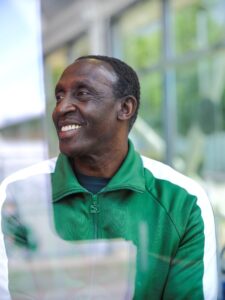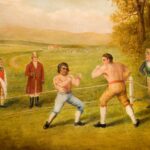By Caroline Heaney, Ben Oakley, Ola Fadoju and Jim Lusted
In July 2024 an impactful OU/BBC documentary ‘Linford‘ exploring Linford Christie’s (1992 Olympic 100m Champion) legacy aired on BBC1 just before the Paris Olympics. As well as charting the highs of his career, the documentary also addressed some of the lows such as racism and doping which were acknowledged in the media as being particularly powerful aspects of the programme. For example, The Guardian described the ‘racist fetishisation’ experienced by Linford as ‘heartbreaking’, whilst Athletics Weekly acknowledged the ‘painful’ sight of two of Linford’s children in tears after watching archive footage of their father facing the trivialisation of racism. In this article four #TeamOUsport staff members reflect on the documentary and the impact it had on them.
Ben’s reflections

Image: Josep Maria Trias, CC BY-SA 4.0, via Wikimedia Commons
At the 1992 Olympics, for Linford’s 100m victory, I was in the Olympic village as part of the Team GB coaching team (windsurfing). That night many Brits crammed around the TV to watch him, aged 32, win the gold. It was one of those shared moments. We leaped around the room in celebration, proud that ‘one of us’ had won the blue-riband event. We all walked a bit taller. In a way it galvanised the GB team.
Watching how his personal story unfolded in ‘Linford’ I now understand that by defending his corner he was often perceived as tricky character by the media. For me, the greatest personal slight and racist trope having scaled the peak of Olympic sprinting history was for the very next day his achievement to be demeaned by the Sun newspaper. Their front page focused on his genitals rather than his supreme global victory. In the Olympic village we didn’t see the papers but now I better understand how racist stereotypes were at play. Would the same have happened to say, Andy Murray after his Wimbledon success or other world beating white athletes? For me, this type of framing of success can’t be dismissed as ‘banter’, it is abusive.
Ola’s reflections
Linford Christie was iconic – he was ‘the man’ who took the fight to the USA sprinters. The way he stood on the starting line, completely focused and dominating everybody in that 1991-93 period made him the greatest in that era. While watching the documentary it was great to see him being honoured but you can also see how much he was maligned by the British media.
I remember fuming in my Haringey bedsit at the subtle racism and gaslighting at play as Linford was having to justify why he was wearing Lycra shorts on the Saint and Greavsie programme, so much so that I wrote a letter of complaint. The British mainstream media never gave Linford the platitudes or spoke about his supreme mental strength and great sprinting ability which contrasted to the positive coverage for white male athletes. The press just wanted to talk about his genitalia as if that was what all Linford was.

Image from Pixabay
He won a case against the Met police in the 1990s and interestingly things haven’t changed as two of the athletes that Linford coaches, Bianca Williams and Ricardo Dos Santos, also successfully took the Met police to court because they were unlawfully arrested and found to be racially profiled by officers in 2020. At the time Linford brought this to our attention on social media and was castigated by many people that he was a ‘race baiter’, rather than being praised for supporting his athletes. How can it be that even now the Police are still racially profiling Black people in the UK?
Linford was the greatest sprinter this country has ever produced. His legacy should be celebrated.
Jim’s reflections
I had just turned 16 when Linford Christie won 100m gold in 1992 but I remember it like yesterday. I got the chills watching the race again via the documentary, aided by David Coleman’s famous commentary. He was one of my childhood sporting heroes – he came from London (like me), he was a sprinter (I liked to run fast too), he took on the brash, dominant North American athletes with all their privileges and beat them all (an easy narrative to get behind as an impressionable teenager).

Image by Steve Bidmead from Pixabay
Looking back now, I think I followed Linford’s career because of these simple personal connections. The racial politics associated with his career only really became apparent to me later as I began to take more of an interest in issues of ‘race’ and racism in sport during my studies and then through my academic career. For me, one of the most fascinating moments in the documentary was when Christie talked about wrapping himself in the union flag after his victory. He notes the controversy this caused, recalling a UK official telling him at the time that ‘this wasn’t something (Black) athletes should be doing’. But this simple gesture took on huge significance as it became an iconic moment well beyond sport; Christie’s flag wearing was an overt display of Black Britishness, one which helped to re-define national identity in late 20th Century Britain. In that respect, it is what Linford did straight after, rather than during, that race in Barcelona all those years ago that is arguably his greatest legacy.
Caroline’s reflections

Image by Claudio Bianchi from Pixabay
As someone who has been involved in athletics since the early 1990s and trained in a similar area of West London to Linford, I felt honoured to be an academic consultant on this documentary with Ben. As an athlete in that period Linford was a legend and it was always exciting when he trained at my track or was at the same competitions as me. To me and others in athletics he always came across as a nice guy, who took the time to speak to people and seemed very humble. It surprised me when others and elements of the media seemed to have a different opinion of him. That differing perspective continues to this day through his perceived legacy since retiring from competition. To those outside of athletics, Linford is perceived to be invisible and to have disappeared under a cloud of disgrace after his drugs ban. Those inside of athletics know that Linford is in fact still very visible, and his legacy has lived on through his role as a coach. Learning from the close partnership he had with his own coach Ron Roddan, Linford has gone on to successfully coach several athletes including Olympic medallists Darren Campbell and Katherine Merry and 2024 Olympian Bianca Williams. His coaching career, however, continues to be touched by issues of drugs and racism. His drugs ban means that he is not allowed accreditation as a coach at any Olympics and so his ability to support his athletes in hindered. Sports coaching as a profession continues to lack diversity with black people typically underrepresented and so Linford’s position as a successful black coach means that he continues to be an important role model and continues to challenge racial stereotypes – an important legacy.
The ‘Linford’ documentary has been instrumental in raising awareness of some of the darker sides of sport that not only affected Linford Christie’s competitive career in the 1980s and 90s, but sadly continue to affect athletes today. Let’s hope that this awareness can be a catalyst for change.
The ‘Linford’ documentary is an Open University (OU)/BBC co-production. You can watch it on BBC iPlayer.
Associated resources exploring why athletic performances continue to improve can also be found on the Open University Connect website.








